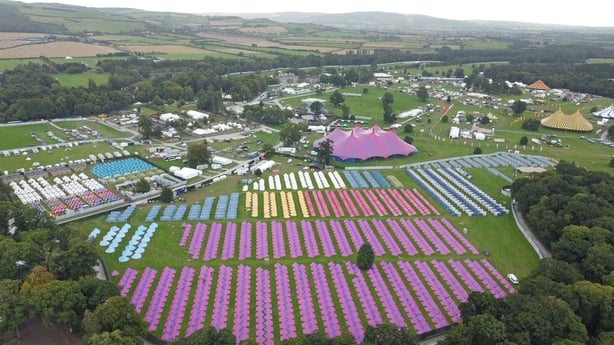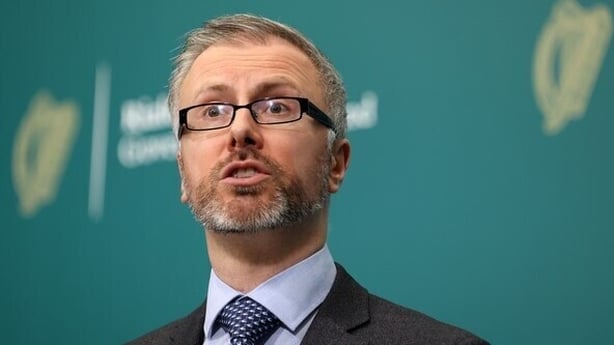The Minister for Integration has said the Government recognises that tented accommodation is not the optimal approach to accommodating a recent spike in arrivals of people fleeing war in Ukraine.
However, Roderic O'Gorman said the Government is examining and in negotiations over other tented accommodations and its use could not be ruled out over the coming months, even as winter approaches.
Mr O'Gorman said people moving into accommodation this week in tents at the Electric Picnic site in Stradbally, Co Laois, would only be there for a maximum of six weeks, but he said other such sites are being sought.
He confirmed that he had engaged with the organisers of the National Ploughing Championships which will be held later this month and a number of major sporting organisations that had provided support in the past, but they are not in a position to provide the same support right now.
Mr O’Gorman said other sites are now being looked at but he could not say where these are at this stage.
He said: "We continue to engage in providing temporary solutions like those provided in Stradbally and those more long-term solutions as well, such as bringing more traditional accommodation online for Ukrainians."
Having peaked at 650 arrivals per week in July, he said arrivals from Ukraine are currently at around 500 people a week, who needed immediate accommodation.
"We have seen that increase over the summer months and that's put us under particular pressure," he said.

"At the same time, we're also looking to move people on from student accommodation, which we used over the summer period, as I suppose a kind of a stopgap measure."
Mr O'Gorman said in the last four weeks, about 2,800 people had been moved out of student accommodation into more long-term accommodation.
The Stradbally site is being used for the next six weeks for those who could not be provided with this accommodation and there is capacity there for up to 750 Ukrainians, including families.
As of this afternoon, he said there are now around 50 Ukrainians being accommodated at the site.
Asked about local engagement in Co Laois and comments by Stradbally Hall owner Thomas Cosby who admitted that community engagement had fallen to the bottom of the list due to the short time frame in which the agreement was made, Mr O’Gorman said: "We had to move very quickly in the context of the use of the Stradbally site because of the need to move Ukrainians out of student accommodation, so that students can use them."
He said the significant amount of additional arrivals from Ukraine over the summer months had added to this pressure.
Mr O’Gorman said where more permanent or longer-term accommodation was being used, the department was getting better in terms of engaging with local residents.
He said on this occasion the need was urgent and that local TDs and counsellors had been informed of the plans and had been briefed on them.
The department said a considerable national effort is being made towards the construction of 700 rapid-build homes, with the potential to house up to 2,800 individuals in family units.
Currently, a total of 204 such units are in place, accommodating 816 people, according to figures from the OPW via the Department of Children, Equality, Disability, Integration and Youth.

These are across five rapid-build sites in Cork, Mayo, Sligo, Tipperary and Cavan, with progress on other sites continuing.
Asked whether tented accommodation was appropriate, particularly for families, he said such accommodation was only being used as accommodation for a small proportion of the 70,000 Ukrainians arriving in the state.
"Right now about 200 are in tents," he said.
"So we use it as a very, very small proportion. We're using it in Stradbally as a temporary measure."
However, he said Ukraine was still in a wartime situation and Ireland would respond to the needs of Ukrainians as they arrived here.
Mr O’Gorman confirmed the Government has again been in contact with the Ukrainian Embassy to inform them of the ongoing difficulties with accommodation.
He said the embassy had recognised what Ireland had done over the last 18 months with 92,000 Ukrainians arriving here and 70,000 being directly accommodated by the state.
Asked about how many other applicants for international protection from outside Ukraine are being accommodated in tents, he said between 200 and 250 people are in that situation.
Mr O’Gorman said this was also a small proportion of the 23,000 arrivals in Ireland, but again this was not optimal.
He said it was a response to the very real pressures his department is facing.
Asked if the arrival of more Ukrainians would mean more international protection applicants would be left in tented accommodation, he said these are two separate accommodation streams, with different levels of support.
The Irish Refugee Council said that the Government has a responsibility to provide clear communications to the public at large but also to communities that are in the process or about to welcome people seeking asylum or who are refugees.
Speaking on RTÉ's Drivetime, Chief Executive of the IRC Nick Henderson said: "I think it's really important, and we said this at the beginning of the year when there were several protests against the opening of centres, that people do have legitimate questions. People are entitled to an opinion.
"They may wonder what the situation is that's about to unfold. And we should all do our very best to answer those questions."
However, he added there was "a very, very fine line" beyond which queries could suddenly or quickly turn into direct discrimination or racism.







